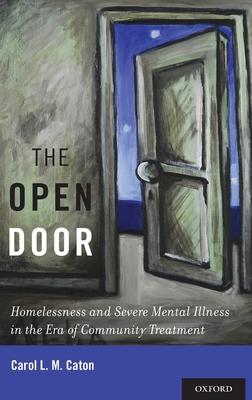The Open Door: Homelessness and Severe Mental Illness in the Era of Community Treatment explains how and why homelessness among the mentally ill has persisted over the past 35 years, despite policy and program initiatives to end it. This ten-chapter book chronicles the unintended rise of homelessness in the wake of far-reaching post-World War II mental health care reforms, and highlights the key role of advocacy in spurring a governmental response to homelessness. The author provides a comprehensive, carefully documented "state of the science" on homelessness, reviews critical issues in managing severe mental illness in the community setting, and presents evidence of the effectiveness of service and housing interventions that have brought stability to the lives of many. Finally, the book reviews the role of homelessness prevention, a recovery orientation, and the promise of early treatment of psychotic disorders to facilitate greater social inclusion and community participation. In addition to providers of housing and services to the homeless mentally ill, this text will appeal to policymakers, mental health professionals, and students of public health and social sciences.
| FindBook |
有 1 項符合
The Open Door: Homelessness and Severe Mental Illness in the Era of Community Treatment的圖書 |
 |
The Open Door: Homelessness and Severe Mental Illness in the Era of Community Treatment 作者:Carol L. M.,Caton 出版社:Oxford Univ Pr 出版日期:2017-04-25 語言:英文 規格:精裝 / 15.9 x 24.1 x 1.9 cm / 普通級 |
| 圖書館借閱 |
| 國家圖書館 | 全國圖書書目資訊網 | 國立公共資訊圖書館 | 電子書服務平台 | MetaCat 跨館整合查詢 |
| 臺北市立圖書館 | 新北市立圖書館 | 基隆市公共圖書館 | 桃園市立圖書館 | 新竹縣公共圖書館 |
| 苗栗縣立圖書館 | 臺中市立圖書館 | 彰化縣公共圖書館 | 南投縣文化局 | 雲林縣公共圖書館 |
| 嘉義縣圖書館 | 臺南市立圖書館 | 高雄市立圖書館 | 屏東縣公共圖書館 | 宜蘭縣公共圖書館 |
| 花蓮縣文化局 | 臺東縣文化處 |
|
|
圖書介紹 - 資料來源:博客來 評分:
圖書名稱:The Open Door: Homelessness and Severe Mental Illness in the Era of Community Treatment
|










